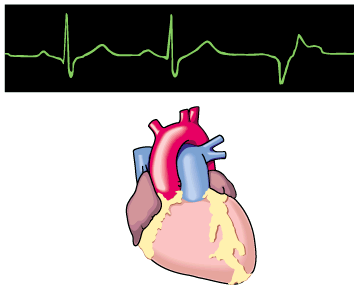

What are some types of ventricular arrhythmias?
What are some types of ventricular arrhythmias?
What’s the relationship between all of these?
An increased frequency of PVC’s in patients with heart disease is STATISTICALLY predictive of ventricular fibrillation and sudden death. This does not mean that every patient with PVC’s, even when frequent, is at high risk of sudden death. In fact, more cases of sudden death occur in people who do not have frequent PVC’s. There are many people who have literally millions of PVC’s throughout their lives, and never have a lick of trouble from their hearts.
In patients with some types of heart disease, PVC’s or ventricular tachycardia do indicate an increased risk of serious arrhythmias.
What symptoms can occur with PVC’s?
The same symptoms that can occur with other arrhythmias. That is, palpitations, lightheadedness, passing out, chest pain, shortness of breath, etc..
What are the causes of ventricular arrhythmias?
Some cases are simply "normal variants", occurring in otherwise normal individuals.
Other causes include:
What sort of tests might be done to evaluate this?
Tests of electrolyte levels, thyroid levels, and other blood tests are frequently done.
An electrocardiogram is necessary to make the diagnosis of PVC’s. Since PVC’s don’t always occur when one is looking for them, several other means have been developed to assess the frequency and severity of the process in some cases. Holter monitors, "heart cards", and "event monitors" may be useful, and are described in the section on arrhythmias.
An echocardiogram (sonogram of the heart) can assess the function and structure of the heart muscle and it’s valves.
Treadmill testing can be completed to assess not only for the possible presence of blockage of the heart arteries (coronary artery disease), but also to see whether more arrhythmias occur with exercise.
Cardiac catheterization, utilizing catheters to measure the pressures in the heart and inject dye in some of its structures, can be very useful in determining the presence of possible associated heart diseases. This is not a routine part of the evaluation, however.
Electrophysiology testing (EPS) can be very informative in some cases. It can be utilized in certain circumstances where the results of the above tests are unrevealing. These studies are performed in the hospital in a suite similar to a heart cath lab. Catheters are inserted in veins and/or arteries and advanced to the heart where very precise recordings of the electrical activity can be obtained. In some cases, catheters are also used to stimulate the electrical system to see if abnormal beats can be "induced".
I’ve been having some lightheadedness with my PVC’s, and I passed out once. What should I do?
Lightheadedness or passing out needs to be evaluated. It is very possible that this is not caused from the ventricular arrhythmias, but it should definitely be checked out.
How can ventricular arrhythmias be treated?
The general principles of treatment are:
What medications are used for treatment?
Beta-blockers (there are many of them) have been shown to cut down both on symptomatic PVC’s in some patients, as well as decrease the risk of sudden death in high-risk patients. In terms of treatment for the palpitations associated with PVC’s, they can often be quite effective but do have side effects which may require their discontinuation.
Specific antiarrhythmics are designed to cut down on the number of PVC’s by altering the electrical properties of the cardiac muscle. Every "anti"-arrhythmic however, has its own "pro"-arrhythmic properties which have the potential to make the rhythm worse, sometimes seriously worse. Many trials of medications designed to decrease the mortality of some types of patients with ventricular arrhythmias actually increased the mortality of the group. These are therefore reserved nowadays for selected patients and monitored closely.
What type of surgery can be done?
Some people have a relatively small amount of tissue in the heart which seems to be the main culprit in starting and maintaining serious ventricular arrhythmias. Such patients can sometimes be treated by removing or destroying this area of the muscle. This is a very specialized area of medicine requiring a lot of expertise.
"Plain-old everyday" pacemakers are not specific therapy for the vast majority of cases of ventricular arrhythmias. Pacemakers are designed to prevent the heart from going too slow. With ventricular arrhythmias, the problem is of an area going too fast.
That said, there is an occasional case where ventricular arrhythmias occur more frequently because the underlying rhythm is too slow. In this group, a pacemaker may do a great deal of good.
AICD’s (Automatic Implantable Cardioverter-Defibrillators) have taken on a more important role in the treatment of serious ventricular arrhythmias. These devices are similar to a pacemaker, but are designed to deliver a "shock" or electrical discharge in such a way to interrupt serious ventricular arrhythmias. Again, while not for everyone, and certainly not for people with occasional PVC’s for whom they would not do any good, these devices are being improved remarkably quickly and are finding a larger "niche" in the treatment of ventricular arrhythmias.
What kind of doctors treat ventricular arrhythmias?
Family or general practitioners may be able to treat a large number of patients with ventricular arrhythmias. Internists may be called on in some cases. Cardiologists specialize in the heart and are usually comfortable taking care of the vast majority of patients with these disorders. Cardiologists are considered "sub-specialists", but an even more specialized expert is called an "electrophysiologist". This "sub-sub-specialist" has particular expertise in the area of arrhythmias.
Still worried? Still confused?
We hope that this information has proved useful, but it’s not unusual to still
be a bit confused or have other questions. Be sure and discuss your particular case with
your physician.
| Commentary
| Food You Will Love | HeartPoint Gallery | In The
News | Health Tips | What's New |
| Information Center | Home
|